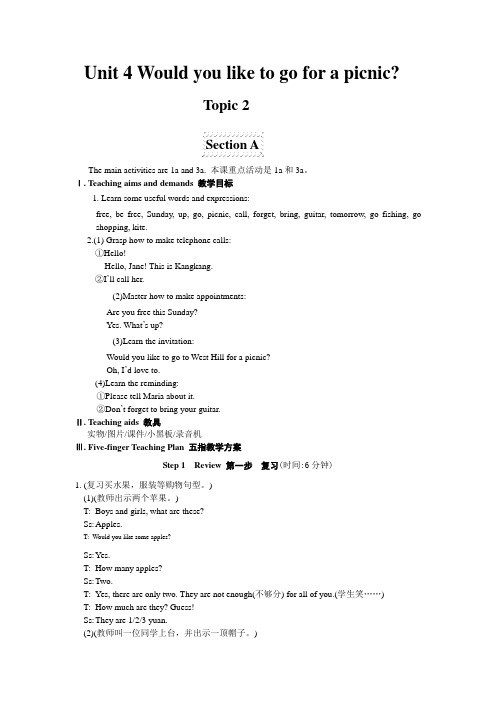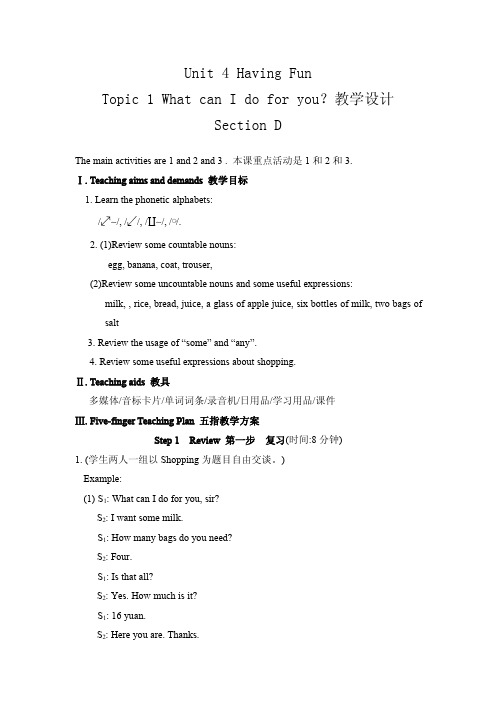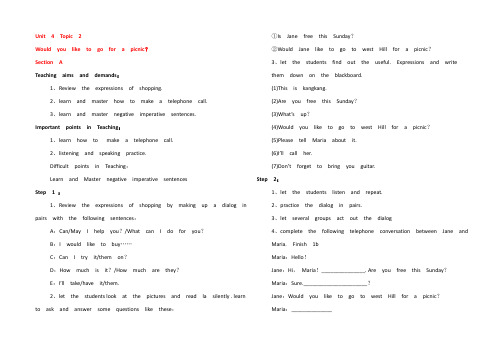七年级英语上册Unit4 Topic2 SectionD教学设计 最新仁爱版
- 格式:pdf
- 大小:107.83 KB
- 文档页数:6

Unit 4 Would you like to go for a picnic?Topic 2Section AThe main activities are 1a and 3a. 本课重点活动是1a和3a。
Ⅰ. Teaching aims and demands 教学目标1. Learn some useful words and expressions:free, be free, Sunday, up, go, picnic, call, forget, bring, guitar, tomorrow, go fishing, go shopping, kite.2.(1) Grasp how to make telephone calls:①Hello!Hello, Jane! This is Kangkang.②I’ll call her.(2)Master how to make appointments:Are you free this Sunday?Yes. What’s up?(3)Learn the invitation:Would you like to go to West Hill for a picnic?Oh, I’d love to.(4)Learn the reminding:①Please tell Maria about it.②Don’t forget to bring your guitar.Ⅱ. Teaching aids 教具实物/图片/课件/小黑板/录音机Ⅲ. Five-finger Teaching Plan 五指教学方案Step 1 Review 第一步复习(时间:6分钟)1. (复习买水果,服装等购物句型。
)(1)(教师出示两个苹果。
)T: Boys and girls, what are these?Ss: Apples.T: Would you like some apples?Ss: Yes.T: How many apples?Ss: Two.T: Yes, there are only two. They are not enough(不够分) for all of you.(学生笑……)T: How much are they? Guess!Ss: They are 1/2/3 yuan.(2)(教师叫一位同学上台,并出示一顶帽子。


Unit4Having FunTopic1What can I do for you?教学设计Section DThe main activities are1and2and3.本课重点活动是1和2和3.Ⅰ.Teaching aims and demands教学目标1.Learn the phonetic alphabets:/ /,/ /,/ /,/ /.2.(1)Review some countable nouns:egg,banana,coat,trouser,(2)Review some uncountable nouns and some useful expressions:milk,,rice,bread,juice,a glass of apple juice,six bottles of milk,two bags of salt3.Review the usage of“some”and“any”.4.Review some useful expressions about shopping.Ⅱ.Teaching aids教具多媒体/音标卡片/单词词条/录音机/日用品/学习用品/课件Ⅲ.Five-finger Teaching Plan五指教学方案Step1Review第一步复习(时间:8分钟)1.(学生两人一组以Shopping为题目自由交谈。
)Example:(1)S1:What can I do for you,sir?S2:I want some milk.S1:How many bags do you need?S2:Four.S1:Is that all?S2:Yes.How much is it?S1:16yuan.S2:Here you are.Thanks.S1:You’re welcome.(2)S3:Can I help you,madam?S4:I want some clothes for my daughter.S3:Would you like this one?S4:Oh,I don’t like the color.S3:What do you think of that blue one?S4:That’s fine.How much is it?S3:80yuan.S4:OK.I’ll take it.Thank you.S3:You’re welcome.(3)S5:Could you help me do some shopping,S6?S6:Sure,what do we need?S5:We need some bread and some salt.S6:How much salt do we need?S5:Three bags of salt.S6:Is that all?S5:Yes,I think so.S6:Oh,some bread and three bags of salt.S5:Yes,that’s right.2.T:Now,let’s come to Section D.(教师在黑板中部上方板书。


Unit 4 Topic 2Would you like to go for a picnic?Section ATeaching aims and demands:1、Review the expressions of shopping.2、learn and master how to make a telephone call.3、learn and master negative imperative sentences.Important points in Teaching:1、learn how to make a telephone call.2、listening and speaking practice.Difficult points in Teaching:Learn and Master negative imperative sentencesStep 1 :1、Review the expressions of shopping by making up a dialog in pairs with the following sentences:A:Can/May I help you?/What can I do for you?B:I would like to buy……C:Can I try it/them on?D:How much is it?/How much are they?E:I’ll take/have it/them.2、let the students look at the pictures and read la silently . learn to ask and answer some questions like these:①Is Jane free this Sunday?②Would Jane like to go to west Hill for a picnic?3、let the students find out the useful. Expressions and writethem down on the blackboard.(1)This is kangkang.(2)Are you free this Sunday?(3)What’s up?(4)Would you like to go to west Hill for a picnic?(5)Please tell Maria about it.(6)I’ll call her.(7)Don’t forget to bring you guitar.Step 2:1、let the students listen and repeat.2、practice the dialog in pairs.3、let several groups act out the dialog4、complete the following telephone conversation between Jane andMaria. Finish 1bMaria:Hello!Jane:Hi,Maria!_______________. Are you free this Sunday?Maria:Sure.______________________?Jane:Would you like to go to west Hill for a picnic?Maria:______________Jane:Don’t forget to bring something to eat.Maria:______________. Bye.Jane:Bye.5、Help kangkang finish his picnic plan according to la and 1b.Time:_____________Place:_____________People:_____________Things:_____________6、Match the sentences in Column A with those in Column BA BA:See you tomorrow. a、Sure.B:please tell him about the picnic. b、yes,what’s up?C:Hello!c、Hello,peter!D:Are you free this afternoon?d、yes,I’d love.E:Would you like to go fishing?e、See you.Step 3:1、let the students find out some questions again.If they don’t have ,the teacher asks some questions.(1)This is Kangkang和I’m Kangkang如何运用?(2)Don’t forget to bring your guitar是一个什么句子?forget后跟动词什么形式?2、Sum up some language points in this section.(1)be free.(2)tell somebody about something.(3)call somebody =phone somebody(4) forget to do something (忘记去做……)doing something (忘记做了……)3、let the students make some grammar exercises first,then practice some language points.(A)根据对话内容填空,每空一词。

Unit 4 Having FunTopic 2 Would you like to cook with us? 教学设计Section DThe main activities are 1 and 2a. 本课重点活动是1和2a。
Ⅰ. Teaching aims and demands教学目标1. Learn the phonetics://, //, //, /au/.2. Review invitation:(1)—Would you like to go to west will for a picnic?—Oh, I’d love to.(2)—Steve, how about flying a kite with me?—I’d like that, but I’m afraid I have no time.(3)—Would you like to have a picnic with old McDonald?—Thanks. That would be very nice.(4)—What about having a picnic with old McDonald?—I’d like that, thanks.3. Review how to make telephone calls.(1)—Hello!—Hello, Jane! This is Kangkang.(2)—May I speak to Maria?—Oh, sorry. She isn’t in now.(3)—Could you ask her to call me back this evening?—Sure.4. Review making appointments.—Are you free this Sunday?—Yes. What’s up?Ⅱ. Teaching aids 教具录音机/单词卡片/课件/单词词条Ⅲ. Five-finger Teaching Plan五指教学方案Step 1 Review 第一步复习(时间:7分钟)1. (教师让学生一起唱教科书上的Class activities “Old McDonald Had a Shop.”以活跃课堂气氛。
Unit 4 havingfun Topic 2技Listen to the dialogue about making phone calls.能Make telephone call calls and take telephone messages目Make invitation标Write telephone conversation and telephone message.Read about picnic planMake telephone callsHello?Hello, Jane! This is Kangkang.Hi, Kangkang.Hello, May I speak to Maria? / I’d like speak toJust a moment, please.功Who’s this/that?能I ’ m afraid you have the wrong number.句Take telephone messages式语Can I take a message? Can you ask him to give me a call?I ’ ll give him the message.言Invitation目标Would you like to with me?How about? / What about?四会词汇free, Sunday, picnic, forget, guitar, swim, plan, time, other,kite, message,ask, back, pardon, afraid, wrong, sing, song, fun, fly, carry,词lonely, next, day汇认读词汇West Hill, soccer, bow, French fries短语go swimming, speak to, have to语 Would法 How questions II.教材分析Section A通过1a的看听说初步了解如何进行电话会话,1b 是对电话用语的训练,让学生熟悉打电话的套话,注意电话用语的特点; 2 是通过听录音填空,掌握建议和邀请及其答语的语境。
Unit4Topic2SectionD教学设计I.Material analysis本课是话题二的第四课时,主要活动是grammar,functions和2a。
Grammar 部分通过教师引导学生自主总结不同人称引导的一般现在时(肯定/否定)表示主观意愿的表达;Functions旨在引导学生总结Sections A-C所学的打电话、邀请、建议及其回答等功能的表达。
另外,通过听音、填空的活动,复习本话题所学的表达主观意愿及邀请别人做某事的表达;通过看图、预测Kangkang一家野炊携带的食物,并在图中勾出,再通过阅读检测是否正确。
一方面复习食物名称,另一方面了解野炊计划,为自制野炊计划做准备;综合探究活动中,通过小组活动讨论野炊计划并通过电话告诉朋友自己的野炊计划,巩固本话题所学表达,提高语言的综合运用能力。
II.Teaching aims1.Knowledge aims引导学生巩固和总结表示主观意愿、打电话、邀请、建议及其回答的表达法并进行交流与对话操练,如:Would you like to...?Thanks.That would be very nice.What about having a picnic...?How about flying a kite...?I’d like that,thanks.Are you free this Sunday?May I speak to Maria?Who’s this,please?Could you ask her to call me back this evening?I’d like to...I want to...2.Skill aims能听懂打电话、邀请、建议等及其回答的简单用语;能正确运用所学表达来打电话、邀请和建议并作出恰当回答;能理解并执行有关学习活动中简单的书面指令;能运用简单的词汇和句型进行写作,描述课外活动的计划。
3.Emotional aims能够积极与同学合作,参与课堂活动,大胆实践;乐于接触并了解异国文化。
III.The key points and difficult points1.能在情景中用“表示邀请、建议、打电话、表达主观意愿”等话题进行交流。
2.能对阅读材料进行信息的提取和判断。
IV.Learning strategies1.能够清楚、大声地进行朗读,培养语感和自信心。
2.培养借助图片来理解文章大意的习惯,提高阅读理解的技能。
3.培养学生对阅读材料进行寻读的技能。
4.能够自己制定预习和复习计划,监控和评价自己的学习。
V.Teaching aids录音机、教学挂图、多媒体和黑板。
VI.Teaching proceduresStep InteractionpatternStudent activity Teacher activityIntroduction (5minutes)1.The wholeclasswork.2.Group workand individualwork.1.Focus their attentionon the teacher.2.Do duty report.Some students readyour passage aboutyour picnic plan to thewhole class.Then theother students answerthe teacher’s questions.T:Hello,everyone!It’smy honor to share mypicnic plan with youhere.Next Sunday,Iplan to go to East LakePark to have a picnicwith my parents.Wewill take some food andsome drinks with us.Ofcourse we will take acamera to take somephotos so that I canshare my photos withmy best friends.Nowwould you like to tellme something aboutyour picnic plan?T:Where is he going fora picnic?Ss:East Lake Park.T:When are theygoing?Ss:Next Sunday.T:Who will he gowith?Ss:His parents.T:What will they takewith them?Ss:Some food and some1.Greet students readyfor learning.2.Help the students totalk about their picnic.Practice the students’spoken English.drinks.T:Will they take an umbrella with them? Ss:Yes,they will. ...Presentation (5minutes)1.Pair work,individual workand groupwork.1.Do Grammar andFunctions.Fill in theblanks in Functions.Check the answers withyour partner.Discuss ingroups and try tosummarize what youhave learned in thistopic.1.Let students learn tosummarize theGrammar andFunctions in this topicby themselves.Consolidation (5minutes)1.Group work. 1.Sit in groups.Makeup new conversationsabout making a telephonecall,making aninvitation,and givingsuggestions,using theexpressions inGrammar andFunctions.(1)Make a telephonecall:1)—Hello!—Hello,Jane!Thisis...2)—May I speak to...?—...isn’t in now.3)—Who’s this,please?—This is...4)—Could you ask herto call me back?—Sure.(2)Make an invitation:1)—Are you free thisSunday?—Yes.What’s up?2)—Would you liketo...?—Oh,I’d love/liketo./Thanks.That would1.Let students preparesome conversations,using the expressionsin Grammar andFunctions.be very nice. 3)—Would you like to...?—I’m sorry I can’t.I have to... (3)Give suggestions: 1)—How about...?—Good idea./All right./I’d like that,but I’m sorry I have no time.2)—What about...?—I’d like that, thanks.Practice (10minutes)1.Individualwork,the wholeclass work andpair work.2.The wholeclass work andindividualwork.1.Do task1.Read theform in Task 1.Understand the mainidea of theconversation.Thenlisten to theconversation and writedown what the childrenwant to do on Sunday.Check the answers withyour partner.Thenlisten again and thewhole class check theanswers together.Afterthat,look at thelistening material givenby the teacher and readafter the tape.Practicethe conversation inpairs orally.Then somepairs act out theconversation.2.Do task2a.Brainstorm the words aboutfood and drinks orsomething else whichyou may take with youwhen you go out for apicnic.Revise thewords of food,drinks1.Play the taperecorder.Make thestudents pay attentionto the intonation,pronunciation andsentence stress.Helpthem revise theexpressions of makinga phone call andwilling.Write downthe listening materialon the blackboard(orPPT).Help the studentsrevise the words offood,drinks and someother things.Makethem look at thepicture and predict thepassage before reading.3.Individual work and pair work.and names of subjects,such as,camera,umbrella and so on.Then look at the picturein2a.Guess what kindof things Kangkang’sfamily may take fortheir picnic.Circlethem in the picture.Read2a carefully andcheck your answers.3.Read the questions in2b.Then read2a againand try to answer thequestions in2b.Thencheck the answers withyour partner.3.Help the studentslearn to get some keyinformation whilereading.Production (10minutes)1.Group work. 1.Do Project.Sit ingroups.Discuss ingroups and make apicnic plan,includingwho to take part in thepicnic,what to takewith,where to go andwhen to start.Thenchoose one studentfrom each group toreport your group’spicnic plan.Then makeup a telephoneconversation to tellyour friends about thepicnic plan in turns.Finally,role-play theconversation in groups.Some groups act out theconversation to thewhole class.1.Let the students talkabout the picnic plan torevise the expressionsof making a phone call,making an invitation,giving suggestions andso on.Encourage thestudents to practicetheir spoken English.2.Assign homework:Review the words andexpressions in thistopic;Make phone calls toinvite more friends togo out for a picnic withyou;Preview Section A,Topic3.Teaching reflection:这节课是本话题的最后一个课时,教师应引导学生自行总结本话题关于表达主观意愿、打电话、邀请、建议等的表达法,再通过任务和综合探究活动进行巩固和操练。